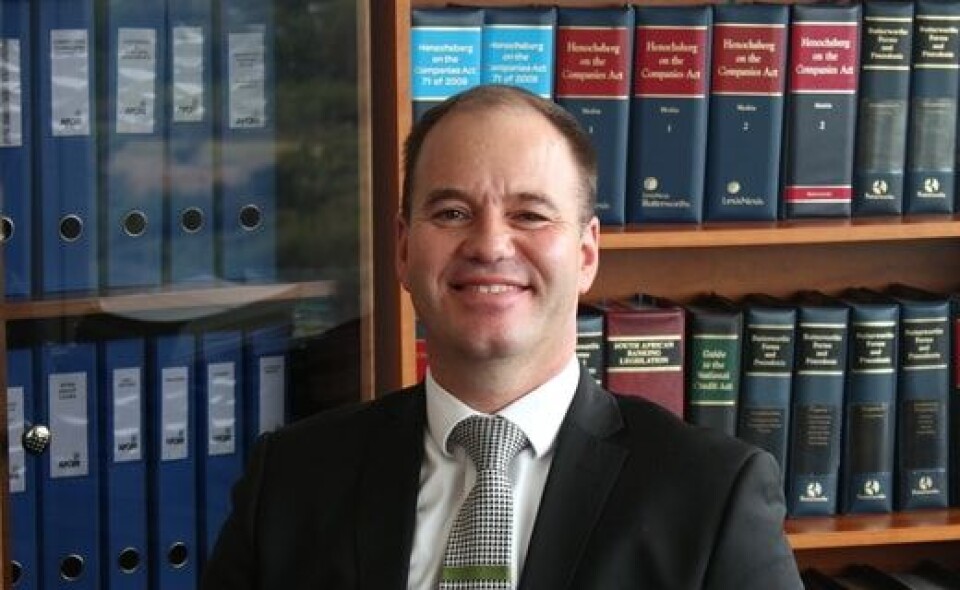Lawyers can be a gnarly and querulous bunch, known to yip, yap, snarl and snap.
That is a bad generalization, but allowances have to be made: a lawyer’s world is a combative one.
Pieter Badenhorst needs no concessions for grouchiness.
The Johannesburg lawyer is the epitome of polite.
The Legal, Risk and Compliance Director for AFGRI Group Holdings, Badenhorst manages the law for the US$1 billion food group owned by US, Canadian and South African shareholders.
The company operates in 12 countries across Africa and in Australia.
Badenhorst, who has degrees in commerce, law and business, heads up a team of five lawyers and has oversight over all legal and compliance affairs relating to the multi-faceted group.
AFGRI employs 4000 people and its diverse agricultural businesses range from selling tractors to storing grain to processing food.
Badenhorst, 48, wanted to become a chartered accountant but changed tack halfway through his studies. Seven years later he had a Bachelor of Law (LLB), Master of Law (LLM), focussed on banking and the stock exchange.
He also earned a Bachelor of Commerce.
All three degrees were achieved cum laude.
He has been with AFGRI Group for the last 10 years, two in his current capacity. It is a job that involves a lot of complicated legal and financial technicalities that span the globe.
AFGRI is an agricultural services company.
Its aim is to enhance the growth of agricultural enterprises.
“I manage the legal risk of the group. What that means specifically is overseeing the drafting of agreements and handling litigation against the group. I provide legal advice to the board of directors in strategic transactions.”
So, most of the company’s big problems cross Badenhorst’s desk.
“Yes, the responsibility does weigh down and sometimes it is daunting, but I enjoy the job. I sit on the board of the operating company and the executive committee. I am part of the day to day operation and it’s a great motivation.
“Over the last couple of years the group has taken various strategic transactions and embarked on new projects in fairly difficult economic trading conditions and that has felt, at times, as if we’ve had to service a Boeing while it was in flight. The flip side is that all those transactions were good for the company and it should thrive and make an impact as a result.”
Law in Africa can be tricky, but understanding the historical context of the legal process in Anglophile, Francophile and Lusophone Africa help enormously. The English system is probably the most universal and the French and Portuguese probably less so.
“It’s easier for South Africans to conduct business in Anglophile areas, like Ghana, for example, but if you rely on good local lawyers you will be fine."
Wherever you do business, local partners are critical.
“Your relationships must be well established with good local lawyers and government, you have to know the regulators.”
Badenhorst says there is a growing move towards standardised language for cross-border commercial agreements, part of the reason why Johannesburg is becoming a centre of influence for global firms operating in Africa.
“Our law offers comfort internationally (because its English base is accessible)…but there’s also a huge criticism of South African firms (legal and otherwise) coming across as arrogant.”
Badenhorst will have no part of that folly.
“Multinational deals have certain procedural characteristics: the rules of engagement. That is becoming increasingly universal and, if you stay true to that, you are generally safe. But I always say, if you’ve done one deal, you’ve done one deal. That’s it, see it for what it is. Every deal is unique, with specific elements. Never be arrogant and assume you know every legal system. You can’t have local knowledge of every system in Africa, so best use local specialists in those countries. There are some very skilled lawyers in Africa. You have to know how to find them or you won’t manage your risk satisfactorily.”
Apparently minor aspects to commercial agreements can be horribly demanding if contested.
Badenhorst says a company in his group chartered a ship and one of the hulls exploded, damaging the cargo and ship. The country where the ship docked didn’t want to accept the cargo, revealing a complicated knot of cross-border legal agreements that proved a horrible headache. It took years for an apparently simple transaction to be resolved.
But for every sorry tale, there are 100 successfully concluded deals.
AFGRI is in the process of buying the South African Bank of Athens, which will hugely increase its offering. AFGRI is a 95-year-old company and Badenhorst says its mandate is clear, which gives his team direction.
“I am blessed to have a highly skilled, dynamic and innovative legal team working for me. We take pride in doing most of the complex legal work in-house, rather than outsourcing it to law firms. During the last year we raised a ZAR1 billion capital did ZAR3.2 billion merger and acquisition transactions all in-house. Not only does this save the group a massive amount of legal fees but the team is engaged and challenged by the complexity of the work.
“We are here to serve this business. That is our reason for existing. We have to provide legal advice and value-added offering that our people will not get from external firms. Once you understand your role, you can follow through and apply that wherever you operate. If you have to do a deal in another country, you have to enable that deal and that business within parameters and with a perspective of that country.”
Work with respect, Badenhorst says. Don’t assume you know it all or gauge your success of legally sound deals alone.
“We are successful if we contribute to the success of the group. We are part of achieving something much bigger, something bigger than being legal. The group’s aim is to be a leading enabler of food security across Africa. That is a noble vision and it motivates us.”

